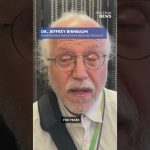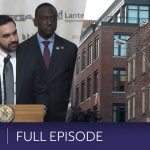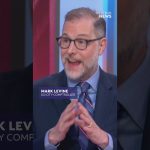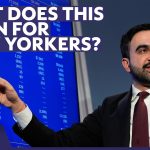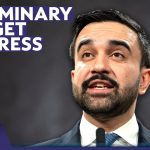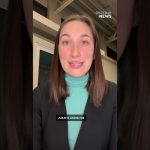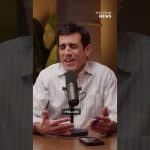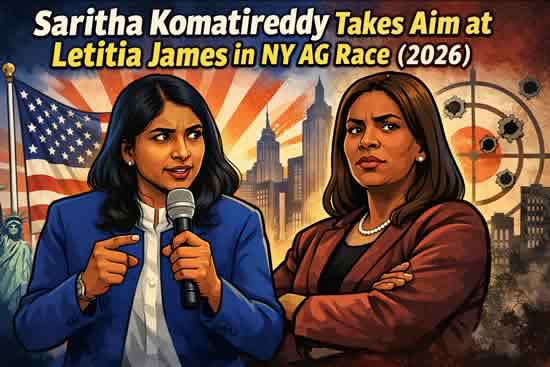Anthony Crowell, Dean, New York Law School: All right everyone, can I ask you to take your seats please? It is great to see all of you this morning. I’m Anthony Crowell, the dean and president here at New York Law School. I welcome you to our first in-person City Law breakfast in three years. I know this community is a community like none other that values this forum, and we’re so proud to be back and look forward to a truly exciting new year with you at the Center for New York City Law. With me here is our director of the Center for New York City Law, Professor Ross Sandler. I can think of no finer way to relaunch our in-house breakfast then to host his honor, the 110th mayor of the great City of New York, Eric Adams, for a wide-ranging, up close and personal conversation covering history, leadership and the future.
Before we proceed, I want to ask all of you for a moment of silence in honor of a highly dedicated public servant, Carol Robles Román, who passed away last week. Carol served as deputy mayor for Legal Affairs and counsel in the Bloomberg Administration.
I worked very closely with her for 11 years and she cared deeply about the city, our people, and about making it a fair and more equitable and just place. Thank you and thank you Mayor Adams for your kind words about Carol on her passing. So did you know the New York Law School counts three mayors among its graduates? John Purroy Mitchel, the 95th mayor, John Francis Hylan, the 96th mayor and Jimmy Walker, the 97th mayor and the 102nd mayor, Bobby Wagner, his father, US Senator Robert F. Wagner Sr. was also a graduate. So many others have served in high positions across the city, state and nation who’ve come through these halls. This all explains why throughout our 132 years, NYLS has been the city’s leading law school for public servants.
Today, one third of our graduates pursue public service roles and I’m extremely confident there are more than a few future mayors in the pool today. I want you to welcome our new 1L’s with me. These are students who just started their journey, 354 of them, and they’re the highest credentialed class ever to enter this law school.
They’re also among the most diverse. 63 percent identify as women, 31 percent as racially or ethnically diverse, 15 percent as LGBTQ+, 25 percent are first in their families to graduate college, 80 percent are first in their families to attend law school and they speak 37 languages. Welcome to our 1L’s. I also want to welcome the many city and state leaders here today. Too many to list, but it includes the top lawyers of the Adams and Hochul administrations, including New York City Corporation Counsel Sylvia Hinds-Radix, Mayor Adams’s new chief counsel, Lisa Zornberg — she’s got her amazing team here with her — and counsel to Governor Hochul, Liz Fine. As the nation’s leading law school for housing law, let me give a special welcome to NYCHA’s new CEO, Lisa Bova-Hiatt. I just want to recognize three recent City Law breakfast speakers: Deputy Mayor Meera Joshi, both Commissioner Asim Rehman and Campaign Finance Board chair, Rick Schaffer.
It’s not something they hear often and the public rarely understands the discipline and determination it truly takes to undertake incredibly complex jobs in public service. But I want to thank you, Mr. Mayor, for all you do for our city, all you’ve done for our city and state for so many years. We are grateful to you for your generosity of being here today to share your wisdom and your thoughts. This conversation today is going to be informed by questions from the audience that will be read by Professor Sandler, in addition to questions that Professor Sandler has developed. So if you have a question for them there, make sure to fill out a card and our staff is here to collect them. I’m going to hand the podium over to Ross and thank you for joining us today for this wonderful conversation.
Professor Ross Sandler, Director, Center for New York Law: Thank you. I’m afraid that might have been Mike Bloomberg. Well, welcome. You do us great honor to be here today with us. This is the 187th of these breakfasts we’ve done and you are the first city mayor to ever honor us to be at a breakfast and we really are appreciative. I should also thank that when we sent out the invitations, we thought we’d have a pretty good response. Well, we had almost 600 people who would say they wanted to be here, and what that tells me is that there’s a tremendous hunger for in-person events. People want to be together, and I was thinking about that this morning. I was thinking there’s a message in that, considering the office situation, the empty offices, the trying to bring people back to the city. This is an event that says people want to be back. What should the city be doing and what can you do to help us get it back?
Mayor Eric Adams: First, I want to just give you, I’m days away from my 64th birthday.
Professor Sandler: Happy birthday.
Mayor Adams: And I want to just give my three Eric-isms. One, we’re all screwed up. Don’t kid ourselves. Everyone wants to be the critics and view what people should do and shouldn’t do, but we’re all going through some difficult moments in life. We’re all perfectly imperfect, as I say to myself. We’re all worrying about do my spouse still love me? Are my children going to do what’s right? Did I make the right call?
We’re in a sea of imperfection and once you realize that you’re not perfect, you’re more tolerant of the imperfection of other people. The second, which I think is so important is that we are all making some difficult choices and some difficult moments right now with all that’s going on. The most important thing is how do we disagree without being disagreeable and mean and painful and nasty? As we’re saying not only across the city but across the globe. The third is there’s 8.1 billion people on the globe, and if you were to ask them even on my worst day, they would change places with me. I’m the mayor of the City of New York.
This is the greatest city on the globe, and there’s no one on the globe that would not like to occupy this place. So when you see me dealing with these challenging times, you’ll say, “Hey Eric, we know it’s hard. We know it’s difficult.” Listen, I got this, I got this. I’m the mayor for a reason. The intersectionality of the challenges we are facing, I’m the right person at this time to navigate this city out of these challenging times and I’m ready for the challenge every day. There’s not one day I wake up and say, “Can we do this or not?” I know we’re going to navigate through this. I’ve been here through September 11th, I’ve been here through the great fiscal crisis. I’ve been here through the peak of crime. I know that no matter what happens, this city is made up of the best stuff on earth and those are New Yorkers. There’s only two types of Americas, those who live in New York and those who wish they could, and I’m the mayor of this city.
Professor Sandler: Let’s hit a pause. The country is divided and you are in a key place to help bring us together. How do you see yourself doing that?
Mayor Adams: Well, you have to have gone through a lot to help people who are going through a lot. When you do a real analysis of this administration and what we have accomplished in 19 months, I know it’s hard to believe because being a mayor is like dog years. One day you feel like you’re living forever. But the success of this administration is remarkable. Everything from our dyslexia screening, returning 99 percent of our jobs that we lost pre-pandemic, what we’ve done around housing, how we’re challenging 104,000 people that entered our city that we have to food, clothe, house, educate their children, give to healthcare. Unlike other cities, not one child or family are currently sleeping on our streets. I challenge everyone, Google Chicago, San Francisco, Los Angeles, California… Google Portland, Oregon. Google all these places and look at what’s happening.
The tent cities that are there, that’s not here. These are the great mayors that are dealing with difficult challenges, but we’ve been able to not only survive, we’re thriving. We are engaging in real conversation. The people we have in our office and come and meet me at Gracie Mansion or City Hall, have never walked into City Hall, Gracie Mansion before. I’ll listen to people and sit down with everyone. But what you’re not going to do, you’re never going to be disrespectful to me, you’re never going to be disrespectful to my team. They work too hard. We will have respectful dialogue and come to a conclusion on how to fix the problems we’re facing.
Professor Sandler: I believe in the respect. This audience is a respectful audience and what we’ve done here for the last 25 years, Michael, I was a commissioner and I felt that there was disrespect for government people. I felt that one of the things we needed to do here at the law school was to build an organization, a place where people and the government could talk to each other. To build those relationships and to build the good feelings for government. You’ve been in government a long time. Do you find people don’t respect government? What do you say to them when they-
Mayor Adams: Well, I don’t think it’s that. I think there’s a lack of civility that we are seeing across our entire country, and I don’t want to be political, but I think it magnified itself when Donald Trump was elected. The country just became so divisive and people don’t seek to understand so they can be understood. They automatically believe whoever’s the loudest and whoever can yell the most is going to really tear each other down. When my brother and I, who’s a retired sergeant in the Police Department, I’ll never forget the two of us sitting down and watching someone pouring water over the heads of police officers. We looked at each other and I said, “We lost the city.” Of the way we talked to teachers, our parents come up to schools and they’re disrespectful to teachers.
Everyone is feeling all this pain, and if we don’t start healing people and the pain they’re feeling, if you are struggling to keep yourself out of a homeless shelter but you work for HRA, you are in pain. So we have to start becoming trauma identifiers, identifying when someone is in pain and how do you identify that pain and give them the help they want. So I don’t think it’s just being disrespectful. People are hurting and that hurt manifests itself in different ways and hurt people, hurt people. This is a city as the old negro ballot says, “You take a close look at my face, my smile is out of place. You see the tracks of my tears.” When I’m on the subway station, I’m seeing the pain of people every day, and we have to start being honest about that pain, and I have to help you deal with the physical and the emotional trauma that people experienced, particularly cycling out of Covid. Some of us lost loved ones, family members. We’ve never really got the therapeutic help we needed after seeing the most devastating healthcare crises and that is what we need to focus on.
Professor Sandler: How do we thank people for that? I remember, I guess many of you did also, my wife Alice and I would go out of our window in our apartment and bang on the kitchenware to thank the people every night at seven o’clock.
Mayor Adams: Yes.
Professor Sandler: We were so happy, and I just spent with time with the doctor and I asked him… He was an emergency doctor at Mount Sinai. I said, “How was it?” He said, “It was horrible. It was horrible. We couldn’t do anything. People were dying. We knew we had nothing, no treatments.” And then he said, “And now nobody remembers.”
Mayor Adams: Right. Well, I remembered. I remember when I did the union contracts, and my first-line responders, we made sure that we gave them the salary that they deserve and we were able to settle over 80-something percent of our contracts. Each one of the votes got around 95 percent, 97 percent ratification. I paid my teachers a salary they deserve. I paid my DC 37 the salary they deserve. I paid my police officers the salary they deserve, my firefighters…
All those frontline people, I didn’t read about them. Let’s be clear on that. I didn’t read about what they were doing. I moved the mattress on the floor of Borough Hall and I spent the night there and I got up in the morning with them and was on the front line with them. It’s easy to sit in the bleachers and be a detached spectator and talk about what we’re doing wrong on the field of battle. You need to get your butt on the field of battle and come fight this stuff with us. Everyone tells you how to do it. Come and show me how to do it. And we did that.
Professor Sandler: Yeah, you did. And you are really in a pivotal position to speak out on these issues on the divisiveness of the country, the need to bring people together, and I hope you do more of it, because you do have a message, and your story and what you’re doing here in the city speaks all to that.
Mayor Adams: You have to be authentic. I like to say cognac and cigars. When I first got elected to State Senate, I was smoking a cigar and holding a glass of cognac and my team said, “You can’t take a photo with that.” I said, “Why not? I smoke cigars and I drink cognac.” I’m not trying to be this fake person. I’m not trying to be what a mayor is supposed to be and what he’s not supposed to be. I’m trying to be Eric Adams. It’s hard enough being Eric Adams than trying to fit into this little image of what Eric Adams is supposed to do.
Now, are there days I wake up and I say, “I wish I would’ve stayed in bed”? Yes. Are there days I wake up and say, “Damn, I’m glad I got out of bed”? Yes, but when you do an analysis of this administration, there’s going to be a retrospective appreciation of how I broke barriers. The first African-American woman to be the corp counsel, first African-American woman to be the first deputy mayor, first Indian woman to be a deputy mayor, first Filipino to be a deputy mayor, first woman to be a police commissioner, first woman to be a fire commissioner, first [Latino] to be a police commissioner, first African-American woman to be first deputy commissioner, first Korean to head Small Business Services.
I mean, when you look down the list, my administration looks like the people of the city of New York, and really, when you think about what we have accomplished, we are going to put up all of our Ws. If you were to look at the tabloids, you would say, “This city is out of order. Everything is going crazy. There’s no success.” It’s like, what city are you in? We get 245,000 people that are visiting Times Square, 3.5 million people back on the subway system. Homicides have decreased. Shooters have decreased. Our major crimes have decreased.
The city’s not coming back. The city’s back. We just got to start acting like it’s back. They have broken our spirits and we need to be walking differently, talking differently, acting differently. We’re in the greatest city on the world and we’re walking around as though we’re broken. We’re not broken. This is an amazing city with amazing people and we are doing the damn thing. That’s good.
Professor Sandler: Yes. You can applaud for that. I noticed it too. The city seems safer to me. The subway seems safer to me.
Mayor Adams: Yes, it is.
Professor Sandler: What more to do? What other things are you thinking about doing?
Mayor Adams: We have a lot more to do. We have a real housing crisis in this city and everyone is saying, “Hey, mayor, do something about it,” and all those who are asking the mayor to do something about it, we want to do a one-on-one to unhouse it. We are creatures of Albany. Albany had a legislative session where the governor and I came out with a very aggressive housing plan, raising FAR of converting office spaces to housing. We had about 138 million square feet of office space that we can convert to housing. Nothing was done on housing. Think about it. Everyone is saying that housing is our number-one concern. Nothing was done in Albany.
And then when we moved throughout the city and say, “Hey, here’s a good place to build housing,” we can have everyone coming out saying, “Yeah, wait a minute. We want more housing. We just don’t want it on our block.” So we have to be honest about this conversation of how do you build more housing in the city?
Now, we rolled out an amazing plan with our team of how you can get housing done, and we’re going to push on the city level, but we need our partners in the City Council and in Albany to also have this focus on housing. Now, we’ve done record numbers of placing people in housing using the FHEPS vouchers, other ways of placing people in housing. But we can fast-track this, but we need help from Albany to do so. We’re a creature of Albany.
Professor Sandler: What do you want Albany to do?
Mayor Adams: Allow us to come up with a real 421a plan. We had a 421a, that’s a tax incentive, that was in place. We know Covid hit and we couldn’t get a shovel in the ground. So let those projects go through, and then we have all of this open office space. We should be converting this office space into affordable housing. We have willing partners that are willing to do it. We are never going to reach the levels we had before with people occupying office space. That’s just the reality. The space should not be sitting vacant. Then we should build in places we’ve never built before. We have too many places in this city that has failed to have their share of affordable housing next to good schools, next to good hospitals, next to good food supplies, next to good transportation. We want to integrate our city, build housing and allow people to live in all areas of the city.
Professor Sandler: So what is holding back on these areas? Is it zoning that needs to be changed or is it…
Mayor Adams: Yes, the zoning. Combination of zoning, lifting the FAR in some locations, allowing us to fast track the conversion that we need to do from office to housing. It’s coming with a real focus and the urgency. That’s the number one issue we have. We have a supply problem in housing and that supply problem must be met with building. We have to build more. We don’t have enough units of housing.
Professor Sandler: Let’s go back to 421a. What’s your prognosis for the next legislative session?
Mayor Adams: I am hoping that we identify the urgency. There was a real conversation around good-cause eviction in housing. I don’t think we have to trade off. I think we can find some form of deal that would deal with the good-cause eviction and at the same time stay focused on the primary reason we are there, is that we have to build more housing.
Professor Sandler: Now that is state legislature. Zoning, though, is within the city’s purview.
Mayor Adams: Yes. We’re looking to do a citywide zoning amendment. We are looking to look at some of the antiquated things we’ve had on the books for a long time, like parking requirements. We want to look at other ways of using spaces, such as being able to use your basement apartments. We need to throw everything at the housing issue. And I just find it insulting, people who are homed, not living in shelters, not going without housing and security, and they’re saying, “Well, we shouldn’t build.” We should build. We all should be looking to place people in a home somewhere. A shelter is not a home. We have to put people in a home, and that is where we all have to be engaged to do so.
Professor Sandler: Okay. There are a lot of questions that I’ve noticed in some of it I looked at. One of them has to do with NYCHA and building on NYCHA property. What’s your thought on that?
Mayor Adams: Big believer in it, and there’s a great exciting project that is going to take place in Chelsea housing. The residents came forward and decided they wanted to move forward with this initiative, and like I said, “Ma’am, you can take the stage and I can sit and listen to you. Okay? But if I’m talking, show me the same respect that you would want.” The Chelsea residents determine what we’re doing. We’re going to tear down the units and build, and move people into the units that we build into. Then when you move people in, we’re going to tear down the units that they were in and rebuild. It’s an excellent example.
Everyone is romanticizing the NYCHA crisis: multi-billion dollar crisis. Everyone is saying the federal government is going to come. Those bugles you hear, that’s not the cavalry. That’s taps. NYCHA is dying and every year we talk about the same thing. We included NYCHA in our housing plan. Never done it before. Never done it before. And we know you have to come up with new, innovative ways to fund and finance housing. Everybody tried to get the land trust out of Albany. They couldn’t do it. We did it.
We are putting more money into building NYCHA. We are focused on NYCHA, but not only building NYCHA, but building the people in NYCHA. NYCHA has some of the highest level of healthcare issues, highest level of children who are not meeting proficiency in education, highest level of crime. When you start doing the analysis, if we lift NYCHA up, we lift the city up. And that is my focus in being NYCHA. No mayor has been in NYCHA more than I have been in NYCHA.
Professor Sandler: That’s good. Good. There are some more questions on NYCHA, but I want to switch back to something you said earlier about dyslexia.
Mayor Adams: Yes.
Professor Sandler: We had that in my family too. It’s tough. It is tough. And you’ve spoken out about it and you’ve started a program for the city schools. What would you like to tell the public and parents about dealing with children with dyslexia?
Mayor Adams: Listen, if you don’t educate, you will incarcerate. 80 percent of the people on Rikers Island don’t have a high-school diploma or equivalency diploma. 30 percent nationally of those who are incarcerated have a learning disability in general, and specifically dyslexia. When I sit down with young people who have traveled on the wrong road and ask them, “How many of you have a learning disability?”, at least 80 percent of them raise their hand.
We have failed young people and betrayed them in the educational system, not only in New York but in this country. I mean, when you look and see the proficiency rates in all of the big cities, you notice that they don’t meet the minimum standards. And that was when Chancellor Banks went in, changing this whole reading curriculum that we put in place.
I always say the quote of Archbishop Desmond Tutu: “We spent a lifetime pulling people out of the river. No one goes upstream and prevent them from falling in the first place.” We have a downstream mindset. And you know who we’re pulling out of the river, and we have to be honest about it. We’re pulling out of the river Black and Brown people. We have profitized pulling people out of the river. We have all of these programs and nonprofits and social programs to take people out of the river. How about going upstream and stopping them from falling in the river?
So what we’ve done, we’re doing dyslexia screening. Over half a million children were screened for dyslexia and literacy. We’ve identified 1,500 who were given intensive care because we identified them as having learning disabilities. So imagine, those are 1,500 children that are not going to go through the path that I went through. I didn’t learn I was dyslexic until I was in college, and I was so frustrated. I used to pray every day, “God, please, just don’t have the teacher call on me and ask me to read.” If I could just get through my day with not being dehumanized because I couldn’t read and I didn’t understand. You get frustrated.
Those are the children you see that are out on the streets committing crimes. By the time they have that gun in their hand, we failed them already. And we are responding to that, and that is what we are zeroing in on. Not only doing dyslexia screening in our schools; we are going to do literacy screening in our jails. So when someone gets out of jail, they should be able to understand what they need so they’ll be a productive citizen in society.
Professor Sandler: Are you getting private help as well as public help here? Are there organizations, are there private entities that are helping on this?
Mayor Adams: Listen, we believe that everyone needs to be part of this turnaround of the city, and I have to take my hat off to the corporate entities, Kathy Wylde and many of our top corporations who have really reengaged themselves on how we’re going to be partners in this city. They have helped us with everything from paid internships, what Google is doing with some of our internships, Pfizer and others. The full scope of the city, we have created this energy that we are all working together on how do we get this city back on path?
Now, if you were to look at the extreme right and extreme left, they will always just find reasons to criticize. But the everyday New Yorker want those who are dealing with severe mental health illnesses to get the care they want and not be on our subways and streets. Everyday New Yorkers don’t want guns on our streets. That’s why we remove over 11,000 illegal guns. Everyday New Yorkers want to swipe their metro card and get on the subway system that’s safe, where a family member won’t have a Michelle Go situation, with young ladies promising career, pushed on the train. I listen to everyday New Yorkers and I know the city they want and that’s a city that we are providing for them.
Professor Sandler: I should say that I’m the chairman emeritus of New York Edge and Francis Greenburger is the chair now. We’re the largest provider of afterschool programs in the city, and I thank you and your administration for the great support and we’re not the only one. There are many, many organizations that providing terrific support. What would you say, can we do more for afterschool and weekends and summer? What can we do more on that?
Mayor Adams: Yes, that’s a great question. I say it to community groups all the time when they say that we don’t have many afterschool programs. We tend to believe that an afterschool program must be this grand thing. No, get a football and have your own little football program. If you are an accountant, do a financial literacy program. If you are a medical professional, do a health program on healthy eating habits that we should do. We all can do something.
We can’t be just … what are we doing in our after hours? And we could do far much more. And I think the partnership of finding those best practices and duplicating them, scaling them up, reaching out and finding your passion. There’s so many New Yorkers that want to give back in a real way. And our role, and I think our first deputy … I don’t know if she’s here, First Deputy Mayor Sheena Wright. And coming from the United Way, she has a full scope in understanding how our nonprofits have been filling the gap for a long time. We the first office to open an office of nonprofits to help them make sure they get paid for the services that they do and provide for this administration.
Professor Sandler: It’s very important.
Mayor Adams: Oh, without a doubt. Without a doubt. For far too long they weren’t. We were asking them to do the job and after they do the job, we want to pay them 60 cents on a dollar.
Professor Sandler: Or you pay them late.
Mayor Adams: Right. And we want to streamline the dysfunctionality of government. My legacy is going to be three things. It’s going to be to continue to be the safest big city in America. We’re going to be one of the healthiest cities in America. Outside of law enforcement, my health initiatives are going to really lead the way across the country. And third, government has to work. Has to run. G-S-D, Get Stuff Done. It’s taking too long to get things done and we are so caught up in the bureaucratic of why we can’t do something. This is a city of yes. To get it done. And we can’t take long in doing so.
Professor Sandler: That’s a great goal. You mentioned health. We haven’t talked about health. What is your mind when you say the healthiest city?
Mayor Adams: Listen, I don’t care who you are, in this room right now, when you said health, everyone in this room thought about someone in their life that is going through a healthcare crisis. We have a sick care system, not a healthcare system. People wait until you get sick and then they find out how much medicine you can have. The pharmaceutical companies have hijacked our healthcare system.
I would have been on Insulin, Metformin, Statin, all these other drugs for the rest of my life if I did not do something revolutionary and go to Google and Google “reversing diabetes.” Vision loss. Doctor said, “Eric, you’re going to be blind in a year.” Nerve damage. You’re going to lose some fingers and toes. Had an ulcer. High blood pressure. I had the American package. And merely because I didn’t go down the traditional road and say, “No, there’s something better than this.”
And so what are we doing around health in the city? Everyone said it was impossible. We are feeding our children better food in schools. We have been feeding the healthcare crisis and there’s so much pushback. We get that, “Why are you taking these hot dogs away from my child.” Because it’s part of child obesity. And then on the campaign trail…
Professor Sandler: Please don’t look at our food over there.
Mayor Adams: I’ll never forget—
Professor Sandler: You’re going to embarrass us.
Mayor Adams: But listen, it is not meeting people where I am. It’s meeting people where they are and taking them where they ought to be. So we’re not here to demonize people. We’re here to give people information so they can make the right decisions. But governments should not feed your healthcare crises. What you put on your grill in your backyard on Labor Day, you have the right to do that.
But we should not be taking taxpayers’ dollars and feeding a healthcare crisis when the science is telling us it is wrong to do so. So we’re arguing about what type of pizza our children should have in school. That pizza is causing not only physical, but mental health. When I was on the campaign trail and I talked about the connectivity of what food is doing to our mental stability, because it’s hard to believe, but the brain is in the same body that the heart is in.
If food is damaging your brain, duh, it’s going to damage your body also. Food is leading to a lot of the mental health issues that we are facing and we need to have a totality approach. What Dr. Vasan is doing is unbelievable around looking at the complete holistic approach to wellness. How am I mentally and physically well? And that is what we are pushing for in the city. And we’re not going to all get it done in my time as mayor, we know that. But we need to place ourselves on the pathway of dealing with this health crisis that we’re facing. It’s not sustainable.
The number of people who are diabetic, dealing with heart diseases, all of these are food related. We had a meeting yesterday with all of our senior team and he showed us of what causes the healthcare crisis. And I was so happy that everyone saw, that only 10 percent is based on your DNA. 10 percent. We all say, “Well, my mother had diabetes, so I must be diabetic.” No, that’s not true. It’s not your DNA. It’s your dinner. That’s the problem.
Professor Sandler: Good message. I’m going to take it home. I’m going to go to some of the card questions here and I’m going to try and listen to you and read at the same time. I’ll do the best I can.
Mayor Adams: All good.
Professor Sandler: And thank you for those of you who wrote short questions, long questions are really difficult. Okay, so here’s a great short question and the audience is going to be tougher than I was.
Mayor Adams: Listen, first of all, there is no tough question when you’re authentic about what you’re doing.
Professor Sandler: So here’s a tough question. How do you plan to close Rikers by 2027?
Mayor Adams: Well, first of all, the plan was a flawed plan. Let’s start with that. It was a flawed plan from the beginning. There was no plan B. Everyone created this ideal environment and now we’re stuck with something that started at one price tag and now it has ballooned beyond belief. The cost of what it takes and the population. The population has changed.
We built a system where we were looking to house in four smaller jails, around 4,200 population, which we are projected to have around 6,000 of population. So you’re going to build four more jails that is not going to fit the population. Either New Yorkers are going to have to make the determination that if you have 2,000 violent… Because remember we’ve dropped who’s on Rikers right now. You don’t have people on Rikers because they jumped the turnstile. You have people on Rikers that have committed serious crimes.
And if we are going to say that 2,000 of those people are going to be placed back into the community without any form of incarceration for their actions, then you have to ask yourself what community are they being placed back in? The same communities they criminalized in the first place. So we must sit down with the City Council and lay out the facts. Here’s is what is going to cause. Here’s how we could do this. You are our partners. Let’s resolve this issue. And if the City Council with their authority is not willing to reexamine and come up with some new ways of how to resolve this, particularly 50 percent of those who are on Rikers have mental health illnesses. They shouldn’t even be on Rikers. We should be able to treat them and give them the mental health assistance they need. 18 percent are dealing with severe mental health issues and many of them are on Rikers because the system is bottlenecked.
We can’t get people through the system. There should be a holistic approach. How do we reform the process to get people through the system? How do we use technology to allow people to do arraignments, to do some of these Huntley hearings, Wade hearings. We need to think about how do you modernize this system so that, number one, victims are not waiting to find out and get closure to their lives. And those who are not guilty of a crime are not sitting on Rikers somewhere. There needs to be a holistic approach. That’s not only talking about closing the buildings, let’s close the pipeline that feeds the buildings and that is what we are attempting to do.
Professor Sandler: Do you need state legislation for this, for what you [inaudible]?
Mayor Adams: No, this is City Council.
Professor Sandler: All city.
Mayor Adams: This is City Council. We need state legislation to look at our criminal justice system that is moving too slow. It should not take this long to determine if a person has committed a crime and if they should be out. Now, let’s not kid ourselves. We have a couple of defense attorneys that likes a game of stretching out the process for a long time. Let’s be honest, some of the same people that are yelling, “Close Rikers, close Rikers, close Rikers,” you have your defendant on there for a long time because you continue to stretch out the case. There’s a level of honesty to this conversation about Rikers Island.
Professor Sandler: Okay, well, it’s a long conversation and it’s been going on a long time. When I was commissioner, I remember I had to put a ferry boat on Rikers Island. There was 20,000 people there at that time. Terrible.
Mayor Adams: Right.
Professor Sandler: Here’s a question. Again, this is really I guess about migrants. How long are the tents going to be in my neighborhood? It’s Queens Village. So this opens up the question of migrants and tents.
Mayor Adams: Last year I stated to New Yorkers, this is going to come to a neighborhood near you. I stated this to New Yorkers. Two republican governors decided that they were going to punish northern cities, Houston, Chicago, Washington. They started Los Angeles and New York City. And they started shipping migrants here. As soon as we saw last year, I think we were up to 15,000, we stated that Washington, this is a problem. We did not get a response.
We reached out and stated that we all need to be [inaudible]. We need to deal with this at the border. We need to have a decompression strategy. We have almost 108,000 cities across our entire country. Everyone should absorb this. They dropped this all on New York City. We’re up to 104,000. 200 emergency shelters, several HERRCs we’ve opened. We have to feed, clothe, house, healthcare.
Just think about this for a moment. The difference between everyone in this room, I don’t care who you are in this room, if you’re going to your lineage, your family came from somewhere. And there was one period of time we had about 1.3 million people came through Ellis Island and we absorbed them. You know why? Because they had the right to work. This is inhumane. This is un-American that we are telling people you don’t have the right to work. Imagine where your family and your ancestors would be if they could not go and do no matter how menial the job was, they were able to have a vision of being part of the American dream.
What we must do is give people the right to work. Here we have the White House is saying, “Nope, we’re not going to give you the right to work. We’re not going to give you any places for people to be able to house. We’re not going to do an emergency declaration. We are not going to fund this. New York this is your problem.”
This is wrong on New Yorkers. When I hear someone that’s saying in Middle Village, Staten Island or wherever, say, “Eric, why is this tent in my block?” My question is, “Where have you been? I told you what we were dealing with.” Day after day after day, I’m saying, “New Yorkers, we have to rise up. We have to speak to our federal lawmakers and let Washington know that this should not be happening to New York City.” Now, we can’t start saying, “This is unfair that it’s in Middle Village. Then tell me what community to move it to. Should I move it to the South Bronx? Should I move it to Harlem? Should I move it to South Jamaica? No community should be going through this, but the reality is, we’ve had run out of space and I have to open wherever you think.
You think I enjoy displacing children playing soccer on Randall’s Island? I don’t enjoy disrupting the community in Staten Island. I don’t enjoy watching this happen to New York City residents. But we are required to provide basic care. And that’s why Governor Hochul has been a partner on subway safety, on crime, on a host of things. But I think this issue, I think the governor’s wrong. She’s the governor of the State of New York. New York City is in that state. Every county in this state should be part of this. We have 0.05 of the landmass in this state, and we have almost 99 percent of the migrant asylum seekers.
This is a real leadership moment, and all those counties, we are the economic engine of this state. New York goes down, the entire state goes down. And New Yorkers, I want to be honest with you, this keeps me up at night. This could erode everything that we have accomplished. This is a humanitarian crisis of a national proportion that this team, Deputy Mayor Williams-Isom and her team, have been able to manage, but the dam is now about to… It has broken.
Professor Sandler: So, one of the ways that this law school and other law schools are working on is asylum representation with the city. What more could lawyers do? Law students do?
Mayor Adams: You guys have been amazing. You stepped up to the plate and I think history is going to be kind to this law school because of what you’re doing. I think we’ve done over 3,000 applicants of your lawyers who have volunteered. When we put out the call, you were one of the first institutions that stepped up. We cannot thank you enough. We opened up an area when we could process the application. These applications sometimes take four hours to process. It is an antiquated method. We have an eight track method in the iPhone age. I mean, this should be going so rapidly to apply, and so other lawyers across… You don’t have to be a law firm. There’s certain parts of the application that only lawyers can do, but we have non-lawyers that are there. They’re smart, they’re committed. I think every corporation should put out a call to their attorneys and say, “Would you like to volunteer your time?”
If we can get a couple more, all of our firms coming in, helping. We’ve done 3,000. We think we could get to 25,000 by December. It is extremely helpful to get it done, to get them in the application process. Now, everyone is talking about this magical, “Okay, you could get it done in six months.” That’s just not true. It is going to take about a year and a half on average to get people a process, and we need help. Some of the people we have are volunteers, some of them are getting paid, but nothing was more rewarding for me than when I got there and I saw attorneys who were first-generation Americans, and they said, “This is the most fulfilling thing I’ve done as an attorney.”
Professor Sandler: We’re very proud of that program and lawyers want to volunteer. We had our asylum program. We’ll be happy to have the volunteers.
Mayor Adams: And students.
Professor Sandler: And students too, yes. The students, absolutely.
Mayor Adams: Everyone should be… First of all, the migration issue is an international issue, but when I speak to the people in Poland, when I speak to the people in other parts of the globe, how their countries, the citizens of the countries, they have stood up and said, “This is all of our issue,” and we need to do the same, and many of us are doing that. I take my hats off to everyday New Yorkers who are doing just those small things are adding up to the larger things that we are able to accomplish.
Professor Sandler: Here’s another, this is a local question but it sort of raises a bigger issue. Will you help save 83 trees in Fort Greene Park in our environmental justice area?
Mayor Adams: I would love to. I live in that community. I was in the 88 Precinct as a lieutenant. I know Fort Green Park so well. I fought the borough president. At one time, we will only take care of the DeKalb Avenue part of the park. We were ignoring the Myrtle Avenue part of the park where the night shift was, and I told the park commissioner, “I’m not playing that game. There’s one park and you’re going to treat people with the same level of equity,” which we do in a lot of parks in our city. Certain parts of the parks, we give all the resources. Other parts of the park, we don’t, and I noticed that and I’m very clear on that. And so if we need to save the trees there, let me hear the plan. Let’s sit down and talk about what needs to be done. Let’s bring in the park commissioner and let’s figure it out.
I find it amazing sometimes when people say, “Why do you do such and such and such and such?” I said, “Because you never asked me.” How about starting with a conversation and then you go to the demonstration? Not let’s do the demonstration and then say we want to have a conversation.§
Professor Sandler: Speaking of your police experience, you were in the 6th Precinct, which is the one time. That was my precinct.
Mayor Adams: It was a significant precinct in the 6th Precinct. Many people don’t know, the 6th Precinct is down at Christopher Street and there’s a Christopher Street Park. I was a captain, an executive officer in the 6th Precinct, and a lot of people who were part of the LGBTQ community, particularly young people, used to stop in the precinct to speak with me because they were harassed while they were going to the Christopher Street Park. Many of them were thrown out of their homes because when they decided to tell their loved ones that they were gay, they were treated unfairly, and it was a safe haven.
They knew on midnight that Captain Adams was there, and they would come and speak with me and I would tell my police officers, “I don’t want these young people harassed. They’re going through a difficult time.” All they had was that space. There weren’t a lot of safe spaces for a member of the LGBTQ+ community, and they had a safe space in Christopher Park. And as the captain there, I made sure that they were able to do so with a level of dignity. And so I know that precinct of very well and what it means to the cross section of people who are there.
Professor Sandler: We love the 6th Precinct. There’s one more question. Again, the questions are evocative of broader issues. Disabilities, how can the city provide safe crossing on the street for people with disabilities? And of course it raises the whole issue of disabilities, people with disabilities in the city. Speak to that.
Mayor Adams: Yes, and because we’ve had a city for far too long that just was one dimensional and we have an amazing commissioner over at the Mayor’s Office for People with Disabilities. For the first time, we had a round table with those who have hearing impairment and to hear from them. Yesterday, Dr. Vasan made a commitment as we talk about the whole issues around wellness and healthy lifestyle and access to healthcare. The commissioner raised how we have ignored this when it comes to our people living with disabilities. So what we’re doing around employment, we have just some excellent professionals who are not having accessibility to jobs and we’re looking at our city jobs around employment.
I’ll never forget one of the hiring halls that we did. A woman came up to me who was blind and she stated, “I’ve been trying to get a job for a long time and I’m unable to do so.” I took her name and we are just really proud that she was hired and she’s now part of city employment. And so it’s one life at a time, making sure this city is able to be navigated. If you are living with a disability, how do we make sure we come up with a real plan to have a city that’s open and inviting to everyone? We have not always been that, and I don’t know if people understand how much people did not feel as though the city belonged to them.
Something simple as the Japanese community. They wanted to have a parade. They were only allowed to march in a parade inside Central Park, not on the streets. That changed in this administration. The Haitian community hasn’t been talking about for the longest. Why can’t we march in Manhattan? We did that. Something as a flag raising. Being mayor is not only substantive but it’s symbolic. There are a number of communities who never had a flag raised in that Borough Hall… I mean, at Bowling Green until I became the mayor. You know what it means when people come to Borough Hall and they are the large Indian community, and they see Deputy Mayor Meera Joshi, the first Indian American? We don’t know. We don’t really appreciate the symbolism of saying, “You are welcome.” Saying you are welcome is more than what you verbalize. It’s what you actualize, and that is what this administration is about. We are never going to view this city again after this administration the same way.
Professor Sandler: Here’s the last question. You’ve been mayor now for 20 months.
Mayor Adams: Yes.
Professor Sandler: What have you learned about yourself in those 20 months?
Mayor Adams: I’m reading a book right now, David Goggins, a Navy SEAL. I really encourage everyone to read that book. It’s a very powerful book, and there was a lot of… The Eric Adams who swore in January 1st, 2022 is not the Eric Adams that’s in front of you right now. You continue to evolve and you continue to reflect. I feel in the last 20 months, which is very interesting and this is always taken the wrong way but it has to be said anyway, we have to tell our own story. There is clearly a concerted effort to say that this administration is a failure when all the facts, it’s just totally opposite. But there’s just a clear message that we have to give the impression that an administration that has the most people of color at leadership in probably the history of this city, an administration where the mayor has been on Rikers Island talking to inmates and officers more than anyone else, an administration that has rode the subway as much as anything, an administration that has been focused on prevention and intervention.
And so what I learned about myself as in David’s book, is how much pain I can take and endure. How I’m able to really stay focused with all the noise around me. There’s just so much noise around you, and if you move to all the noise, if you move to everyone who is angry and they’re yelling and screaming, you’ll get nothing done. And I’m amazed at this point how immune I am to all that noise. I’m like in this state, wake up in the morning, pray, meditate, exercise, drink my green smoothie, walk out the door and I’m just in this place that is like a zone when you know that you’ve found your place. I found my purpose and now I’m walking into my purpose, and all that distraction, I learned how much I’m able to still move the ball down the field in spite of all of that. You want to know why? Because if you look at a quarterback, the most important thing he must do is have an offensive team around him to protect him for all those who are trying to sack them.
I have Judge Hinds-Radix. I have Sheena, I have Eddie Caban. I have the best offensive line in the game. My job is to move the ball down the field. They’re going to protect me in the process.
Professor Sandler: Well, good. I want to say, we’re going to have many touchdowns in the near future. This has been a wonderful morning. The idea that behind these is to get to know you.
Mayor Adams: Yes.
Professor Sandler: And to hear thoughts and to have this opportunity to be together in a room and just talk, and I thank you for the talk and for the wisdom that you brought to us, and frankly, I’m proud you’re our mayor and I wish you really good luck. One of the traditions… Yes, Danny. Maybe we should stand.
One of the traditions that we have is that we’d like to give the people who speak, here for 17 years and was a wonderful colleague, and she wrote a book that I love called On Juneteenth. And we give it to you with gratitude and thanks for this wonderful morning together.
Mayor Adams: Wait, now this has to be under $50 or Lisa, my attorney’s going to…
Professor Sandler: I have a written… I paid for it with my own money. It’s under 50.
Mayor Adams: Thank you.
Professor Sandler: Thank you so much.
August 29, 2023 New York
Source NYC.gov Official news – Midtown Tribune NEW YORK news –
– Big New York news BigNY.com –

